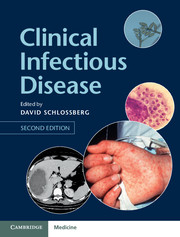Book contents
- Frontmatter
- Dedication
- Contents
- List of Contributors
- Preface
- Part I Clinical syndromes: general
- Part II Clinical syndromes: head and neck
- Part III Clinical syndromes: eye
- Part IV Clinical syndromes: skin and lymph nodes
- Part V Clinical syndromes: respiratory tract
- Part VI Clinical syndromes: heart and blood vessels
- Part VII Clinical syndromes: gastrointestinal tract, liver, and abdomen
- Part VIII Clinical syndromes: genitourinary tract
- Part IX Clinical syndromes: musculoskeletal system
- Part X Clinical syndromes: neurologic system
- Part XI The susceptible host
- 84 Evaluation of suspected immunodeficiency
- 85 Infections in the neutropenic patient
- 86 Infections in patients with neoplastic disease
- 87 Corticosteroids, cytotoxic agents, and infection
- 88 Biologics
- 89 Infections in transplant recipients
- 90 Diabetes and infection
- 91 Infectious complications in the injection and non-injection drug user
- 92 Infections in the alcoholic
- 93 Infections in the elderly
- 94 Neonatal infection
- 95 Pregnancy and the puerperium: infectious risks
- 96 Dialysis-related infection
- 97 Overwhelming postsplenectomy infection
- Part XII HIV
- Part XIII Nosocomial infection
- Part XIV Infections related to surgery and trauma
- Part XV Prevention of infection
- Part XVI Travel and recreation
- Part XVII Bioterrorism
- Part XVIII Specific organisms: bacteria
- Part XIX Specific organisms: spirochetes
- Part XX Specific organisms: Mycoplasma and Chlamydia
- Part XXI Specific organisms: Rickettsia, Ehrlichia, and Anaplasma
- Part XXII Specific organisms: fungi
- Part XXIII Specific organisms: viruses
- Part XXIV Specific organisms: parasites
- Part XXV Antimicrobial therapy: general considerations
- Index
- References
89 - Infections in transplant recipients
from Part XI - The susceptible host
Published online by Cambridge University Press: 05 April 2015
- Frontmatter
- Dedication
- Contents
- List of Contributors
- Preface
- Part I Clinical syndromes: general
- Part II Clinical syndromes: head and neck
- Part III Clinical syndromes: eye
- Part IV Clinical syndromes: skin and lymph nodes
- Part V Clinical syndromes: respiratory tract
- Part VI Clinical syndromes: heart and blood vessels
- Part VII Clinical syndromes: gastrointestinal tract, liver, and abdomen
- Part VIII Clinical syndromes: genitourinary tract
- Part IX Clinical syndromes: musculoskeletal system
- Part X Clinical syndromes: neurologic system
- Part XI The susceptible host
- 84 Evaluation of suspected immunodeficiency
- 85 Infections in the neutropenic patient
- 86 Infections in patients with neoplastic disease
- 87 Corticosteroids, cytotoxic agents, and infection
- 88 Biologics
- 89 Infections in transplant recipients
- 90 Diabetes and infection
- 91 Infectious complications in the injection and non-injection drug user
- 92 Infections in the alcoholic
- 93 Infections in the elderly
- 94 Neonatal infection
- 95 Pregnancy and the puerperium: infectious risks
- 96 Dialysis-related infection
- 97 Overwhelming postsplenectomy infection
- Part XII HIV
- Part XIII Nosocomial infection
- Part XIV Infections related to surgery and trauma
- Part XV Prevention of infection
- Part XVI Travel and recreation
- Part XVII Bioterrorism
- Part XVIII Specific organisms: bacteria
- Part XIX Specific organisms: spirochetes
- Part XX Specific organisms: Mycoplasma and Chlamydia
- Part XXI Specific organisms: Rickettsia, Ehrlichia, and Anaplasma
- Part XXII Specific organisms: fungi
- Part XXIII Specific organisms: viruses
- Part XXIV Specific organisms: parasites
- Part XXV Antimicrobial therapy: general considerations
- Index
- References
Summary
Introduction
Infections are the most common complication of organ and tissue transplantation. While the focus of antimicrobial prevention after transplantation has been on reducing the incidence of opportunistic infections, transplant recipients remain at risk of virtually any bacterial, fungal, viral, and parasitic pathogen. These pathogens cause clinical disease with increased severity in a transplant recipient. Several factors inherent to the transplant recipient or related to the donor, the environment, and the circumstances surrounding the transplant procedure (such as surgical techniques and immunosuppressive drugs) increase the risk of infectious complications. Generally, the overall infection risk after transplantation is determined by (1) epidemiologic exposures of the donor and the recipient and (2) the overall net state of immunosuppression.
Epidemiologic exposures
The major sources of pathogens are (1) the transplant recipient who may harbor latent, active, or subclinical infection prior to transplantation; (2) the donor who may harbor latent, active, or subclinical infection that could be transmitted through the allograft (donor-derived infections); and (3) the environment (hospital and community). Table 89.1 lists some risk factors for acquiring infection after solid organ transplantation.
THE TRANSPLANT RECIPIENT
The epidemiologic exposures of potential transplant recipients should be assessed to determine the risk of infection and guide preventive measures. Table 89.2 lists the recommended screening tests in the evaluation of potential recipients (and their donors) prior to transplantation. Some candidates will be found to have active infection; these infections do not generally preclude transplantation, but they should be adequately controlled and treated prior to and after the transplant procedure.
THE TRANSPLANT DONOR
The epidemiologic exposures of transplant donors should be determined so that the potential for donor-derived infections is reduced.
- Type
- Chapter
- Information
- Clinical Infectious Disease , pp. 573 - 584Publisher: Cambridge University PressPrint publication year: 2015
References
- 1
- Cited by



